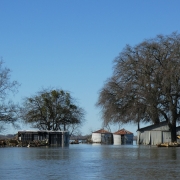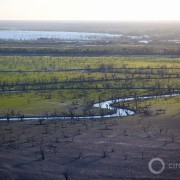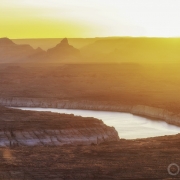IUCN World Congress Signals New Direction For Conservation
Urgency of climate change and environmental degradation requires novel mindset to protect water, forests, and oceans.

The 2016 World Conservation Congress in Honolulu is the largest gathering of environmental policymakers and advocates in the IUCN’s history. Photo © Codi Kozacek / Circle of Blue
By Codi Kozacek
Circle of Blue
HONOLULU — More than 10,000 environmental delegates, representatives, and participants from around the world descended on Hawaii last Thursday to kick off the World Conservation Congress of the International Union for the Conservation of Nature. The quadrennial event, often called the Olympics of environmental conservation, has been both a celebration of recent successes and a grim recognition that much more is needed to prevent the world’s remaining natural splendor from fading into history.
It is the first time the United States has hosted the Congress in the IUCN’s 68-year history. Past gatherings fostered landmark international agreements such as the Convention on International Trade in Endangered Species and the Ramsar Convention on wetlands. This year, the Congress comes on the heels of two of the most ambitious environmental roadmaps laid out in more than a decade: the Paris climate accord to cut carbon emissions and the 2030 Sustainable Development Goals. Keynote speakers at the opening ceremony on Thursday, including U.S. Secretary of the Interior Sally Jewell and Palau President Tommy Remengesau, called on attendees to turn those global guideposts into real action on the ground.
The environmental, economic, and social movements have to come together.” — Julia Marton-Lefèvre, Former Director General, IUCN
If the Paris accord and the SDGs are a source of undeniable hope and optimism at the Congress, there is also an overarching sense of realism that pervaded the hundreds of presentations and discussions over the weekend. It is a general realization that much has already been set in motion—whether species extinction or rising global temperatures—and that the progress made toward preserving the environment is not occurring at anywhere near the speed or scale that is necessary to sustain a vibrant society.
“’Later’ is over,” said Thomas Friedman, foreign affairs columnist for The New York Times, who moderated the first high-level session. “Later will now be too late.”
In the face of the urgency and severity of the global environmental crisis, leaders at the Congress acknowledged that success in the 21st century will require a major mindset change in the conservation sector. Traditionally, conservation has relied on a relatively narrow community of environmental advocates and scientists, taking a similarly insular approach to creating protected areas fenced off from the general public.

The Water Pavilion at the IUCN World Conservation Congress has hosted discussions on transboundary water sharing, peatlands, and the restoration of wetlands, among other topics. Photo © Codi Kozacek / Circle of Blue
That methodology must evolve if the conservation movement hopes to achieve its goals. Speakers advocated for a much more inclusive community that embraces businesses and financial institutions, youth, and indigenous communities. Private finance, they said, is an absolute requirement for scaling up conservation projects to a level that can shield species from extinction, preserve ecosystem services like clean water, and make communities resilient to climate change. In her opening ceremony address, Secretary Jewell highlighted the need for a more strategic effort to protect landscapes as a whole, rather than preserving disconnected areas through “random acts of kindness”. And leaders emphasized that, on its own, raising awareness and setting aside protected areas for nature is no longer enough. Instead, the conservation ethic must infuse financial and political systems.
“Maybe environmentalism shouldn’t have a future on its own,” said Julia Marton-Lefèvre, former director general of the IUCN. “The environmental, economic, and social movements have to come together.”
Examples of what happens if conservation fails are abundant. Again and again, scientists and environmental workers at the Congress reported seeing the rapid devastation wrought by climate change and development—on coral reefs, on river basins, on forests and on mountains. The updated IUCN Red List for endangered species, for example, found that nearly 24,000 of the 83,000 species assessed globally are threatened with extinction. That includes 87 percent of the 415 endemic Hawaiian plants assessed so far. The destruction of Hawaii’s native forests and plant life, which capture rainfall, has significant implications for the islands’ water supply.
What we’ve done is unwittingly put ourselves in the test tube where the experiment is being undertaken.” — Dan Laffoley, Principal Advisor of Marine Science and Conservation, IUCN Global Marine and Polar Programme
A new report on ocean warming was also released at the Congress. Pulling together the most recent science from 80 researchers around the world, it illustrated a dismal picture of species decline and startling change. More than 90 percent of the global warming produced by greenhouse gases since the 1970s has been absorbed by the ocean, “shielding” the rest of the world from the worst effects of climate change, according to Dan Laffoley, principal advisor of marine science and conservation for the IUCN’s Global Marine and Polar Programme. If the energy released since the 1950s had instead gone into the atmosphere, air temperatures would have increased 36 degrees Celsius.
The consequences for marine life are dire. Species are shifting toward the poles by up to 10 degrees latitude, much faster than comparable moves on land. The timing and location of food availability is changing, disrupting patterns that migratory species depend on for survival. And warming water temperatures are leading to stronger storms that flood coastal communities, as well as more intense El Nino events that can cause severe droughts and floods across the globe.
“We’re no longer the casual observers in the room,” said Laffoley. “What we’ve done is unwittingly put ourselves in the test tube where the experiment is being undertaken.”
A news correspondent for Circle of Blue based out of Hawaii. She writes The Stream, Circle of Blue’s daily digest of international water news trends. Her interests include food security, ecology and the Great Lakes.
Contact Codi Kozacek










